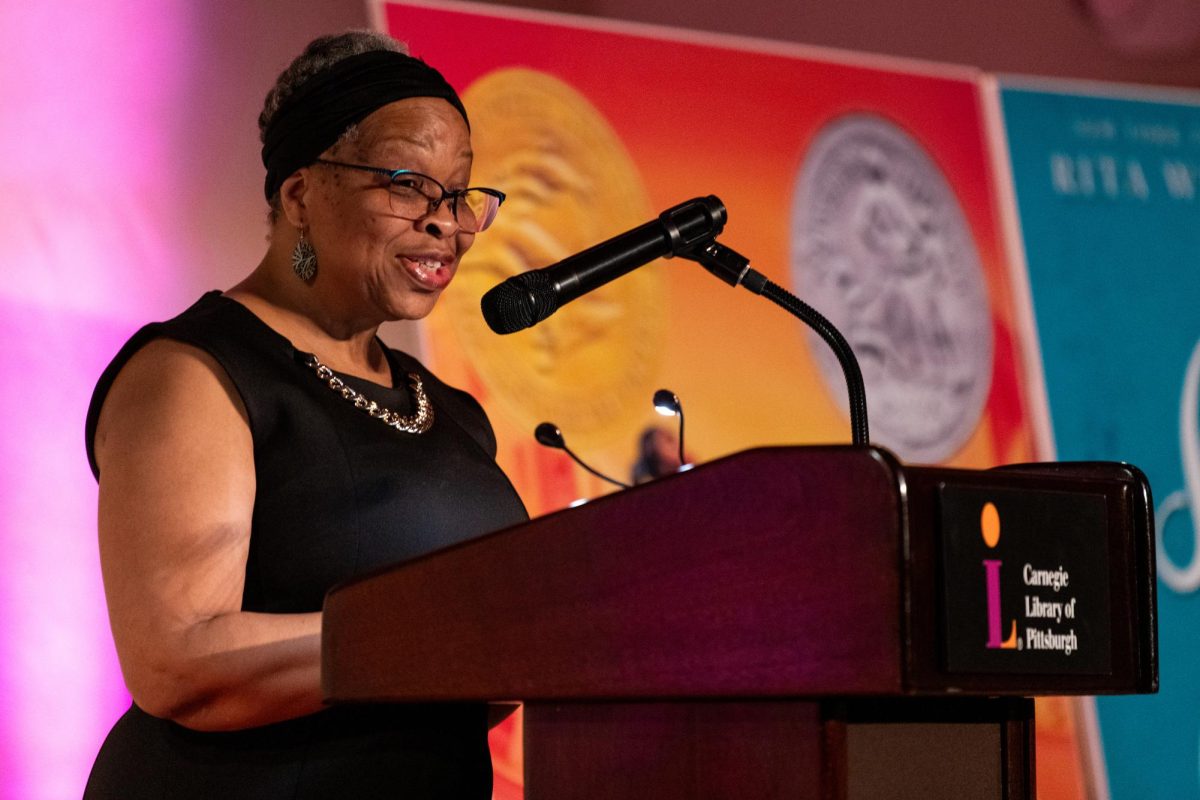According to Rita Williams-Garcia, memory is vital to the human experience.
“Without memory, we cease to exist,” Williams-Garcia said.
The School of Computing and Information partnered with the Carnegie Library of Pittsburgh to host the Association for Library Service to Children’s 2024 Children’s Literature Lecture on Wednesday evening. The ALSC chooses one library each year to host this lecture, and Carnegie Library won the bid for 2024.
The lecture featured keynote speaker best-selling children’s and young adult author Williams-Garcia, whose bibliography includes “Blue Tights,” “One Crazy Summer” and “P.S. Be Eleven.” Her lecture focused on human memory and its importance to societal progress and our development as people.
“I just wanted people to value, not just memory in general,” Williams-Garcia said, “but especially their childhood memories, because I think childhood memories help to tell your own origin story. You can be your own superhero in your life. You know, you can direct your fate by knowing where you come from.”
Williams-Garcia spoke about how people develop memories and what memory means to her. She illustrated her point by reading passages from her stories and retelling moments from her own life, such as when she met the late Senator Robert F. Kennedy. Her family insists that he picked her up in his arms to take a photo, but she remembers it quite differently.
“As a 10-year-old tomboy, I would have been humiliated!” Williams-Garcia said.
Williams-Garcia originally considered leaning into more politically relevant topics but eventually decided on a broader, timeless theme.
“At first, I was going to do memory and erasure because I was so concerned about curriculum not being taught for political reasons,” Williams-Garcia said. “But then I just kept feeling like we all are on the same bandwagon. So what do I really have to add to that? Something made me think of the first books that I read … And so I thought, ‘I have a whole lot of childhood memories.’ And I think that’s what I should focus on — the importance of childhood memories and how they help you tell your own story.”
Caroline Harib-Dettun, who attended the event with her son, said Williams-Garcia’s message taught her about how society views memory.
“Memory essentially depends on the people who are there at the time, and everybody remembers things differently,” Harib-Dettun said. “And that’s what she emphasized — just because [a moment] means one thing to you, that doesn’t mean that’s how I remember it.
Williams-Garcia specifically touched on how memory affects the way society views racial labels such as “Negro,” “Colored” and the N-word even as their meanings change with the times.
“It was really interesting hearing about her childhood and her upbringing and her views on being African-American and what she saw as that label,” Mara Bett, a senior social work major, said.
If there’s one thing to take away from the lecture, according to Williams-Garcia, it’s to examine what your childhood memories “mean to you.”
“What is your most important or significant early memory, and why is that important to you?” Williams-Garcia asked.
Carnegie Library prioritizes the children’s services it provides, which is why it applied to host this year’s ALSC lecture, according to Mary Monaghan, director of public services.
“We have a very strong history of providing services to children and honoring children’s literature,” Monaghan said. “It was really just another way to highlight that passion for us how important these kinds of services are and how important children’s literature is. It was such a huge honor to be selected as the site [for the lecture].”
Monaghan said when the library saw the ALSC selected Williams-Garcia, they knew they had to push to host it at their Oakland location.
“We love Rita’s work, so one of the goals was just to get her here,” Monaghan said. “When we saw that she was the selected lecturer for 2024, we wanted to really go for it.”
Storytelling comes naturally to Williams-Garcia, which is why the prospect of this lecture “excited” her.
“I’ve been talking to myself [since I was] a small child, and I also had a family that loved to hear stories, so I could say them out loud,” Williams-Garcia said. “So I’ve always had that early audience that helped me out a lot.”
If there’s one piece of advice Williams-Garcia can give young writers aiming to follow in her footsteps, she said “don’t wait for permission.”
“Just start. Whether it’s on your phone or you’re writing a little bit here and there, just get it out. Just do it,” Williams-Garcia said. “No self judgment. Keep at it, because every day you learn something, you write a little better. So don’t seek perfection. Just tap into yourself and give yourself permission to [write].”


